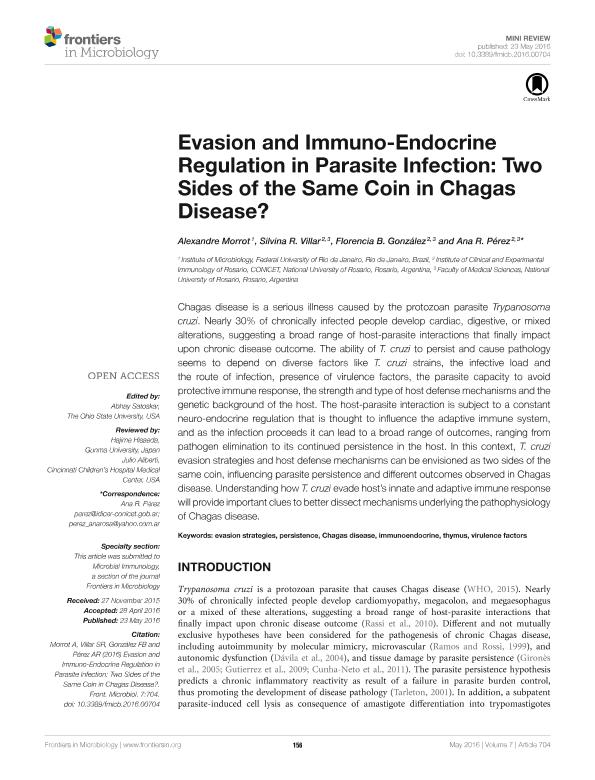Capítulo de Libro
Evasion and Immuno-Endocrine Regulation in Parasite Infection: Two Sides of the Same Coin in Chagas Disease?
Título del libro: Immune evasion strategies in protozoan-host interactions.
Morrot, Alexandre; Villar, Silvina Raquel ; González, Florencia Belén
; González, Florencia Belén ; Perez, Ana Rosa
; Perez, Ana Rosa
 ; González, Florencia Belén
; González, Florencia Belén ; Perez, Ana Rosa
; Perez, Ana Rosa
Otros responsables:
Morrot, Alexanadre
Fecha de publicación:
2020
Editorial:
Frontiers Media
ISBN:
978-2-88966-294-4
Idioma:
Inglés
Clasificación temática:
Resumen
Chagas disease is a serious illness caused by the protozoan parasite Trypanosoma cruzi. Nearly 30% of chronically infected people develop cardiac, digestive, or mixed alterations, suggesting a broad range of host-parasite interactions that finally impact upon chronic disease outcome. The ability of T. cruzi to persist and cause pathology seems to depend on diverse factors like T. cruzi strains, the infective load and the route of infection, presence of virulence factors, the parasite capacity to avoid protective immune response, the strength and type of host defense mechanisms and the genetic background of the host. The host-parasite interaction is subject to a constant neuro-endocrine regulation that is thought to influence the adaptive immune system, and as the infection proceeds it can lead to a broad range of outcomes, ranging from pathogen elimination to its continued persistence in the host. In this context, T. cruzi evasion strategies and host defense mechanisms can be envisioned as two sides of the same coin, influencing parasite persistence and different outcomes observed in Chagas disease. Understanding how T. cruzi evade host’s innate and adaptive immune response will provide important clues to better dissect mechanisms underlying the pathophysiology of Chagas disease.
Archivos asociados
Licencia
Identificadores
Colecciones
Capítulos de libros(IDICER)
Capítulos de libros de INSTITUTO DE INMUNOLOGIA CLINICA Y EXPERIMENTAL DE ROSARIO
Capítulos de libros de INSTITUTO DE INMUNOLOGIA CLINICA Y EXPERIMENTAL DE ROSARIO
Citación
Morrot, Alexandre; Villar, Silvina Raquel; González, Florencia Belén; Perez, Ana Rosa; Evasion and Immuno-Endocrine Regulation in Parasite Infection: Two Sides of the Same Coin in Chagas Disease?; Frontiers Media; 2020; 156-165
Compartir



